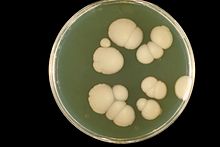Colony (biology)
In zoology and microbiology, a colony is a group of organisms that live in close proximity to one another and whose settlement area is spatially separated from other settlement areas of the same species . Colony formation can occur in very different living beings .
Microorganisms
Continued cell division creates accumulations of microorganisms , especially in bacteria , which form a loose cell structure, so that a colony develops and grows . This organization of cells that are still undifferentiated and not yet specialized in their function is viewed as a preliminary stage of true multicellular organisms.
Multi-cell
A coherent association in the cnidarians , e.g. B. in the state jellyfish , stone , octopus and fire corals , arises through asexual reproduction (for example by means of budding ). There are similar colonies with bog animals , salps and sea squirts . In rotifers , for example, the species Conochilus hippocrepis forms colonies.
Solitary animals

Group formation from a large number of individual animals of the same species that live together temporarily or permanently in a relatively narrow space; for example beaver colonies on river banks, breeding colonies of birds , for example flamingos or penguins .

